Universe Expanding More Rapidly Than Previously Thought – New Research
Eddie Gonzales Jr. – MessageToEagle.com – A group of astronomers led by the University of California, Davis has obtained new data that suggest the universe is expanding more rapidly than previously thought.
Using Keck Observatory’s AO system with the Near-Infrared Camera, second generation (NIRC2) instrument on the Keck II telescope, Chen and his team obtained local measurements of three well-known lensed quasar systems: PG1115+ 080, HE0435-1223, and RXJ1131-1231.
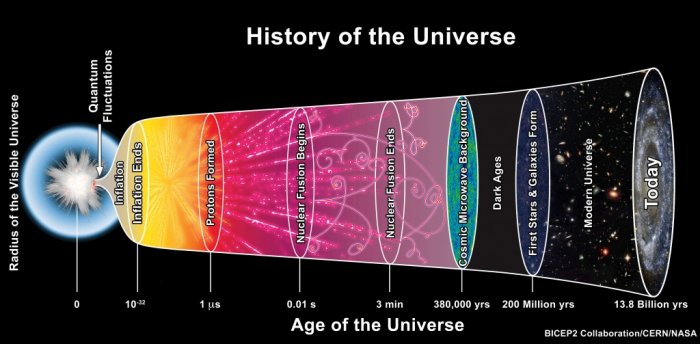 An artist’s depiction of the standard model of cosmology. Credit: BICEP2 Collaboration/CERN/NASA
An artist’s depiction of the standard model of cosmology. Credit: BICEP2 Collaboration/CERN/NASA
The team’s new measurement of the Hubble Constant, or the expansion rate of the universe, involved a different method. They used NASA’s Hubble Space Telescope (HST) in combination with W. M. Keck Observatory’s Adaptive Optics (AO) system to observe three gravitationally-lensed systems. This is the first time ground-based AO technology has been used to obtain the Hubble Constant.
“When I first started working on this problem more than 20 years ago, the available instrumentation limited the amount of useful data that you could get out of the observations,” co-author Chris Fassnacht, Professor of Physics at UC Davis, said in a press release.
“In this project, we are using Keck Observatory’s AO for the first time in the full analysis. I have felt for many years that AO observations could contribute a lot to this effort.”
To rule out any bias, the team conducted a blind analysis; during the processing, they kept the final answer hidden from even themselves until they were convinced that they had addressed as many possible sources of error as they could think of. This prevented them from making any adjustments to get to the “correct” value, avoiding confirmation bias.
“When we thought that we had taken care of all possible problems with the analysis, we unblind the answer with the rule that we have to publish whatever value that we find, even if it’s crazy. It’s always a tense and exciting moment,” says lead author Geoff Chen, a graduate student at the UC Davis Physics Department.
The unblinding revealed a value that is consistent with Hubble Constant measurements taken from observations of “local” objects close to Earth, such as nearby Type Ia supernovae or gravitationally-lensed systems; Chen’s team used the latter objects in their blind analysis.
The team’s results add to growing evidence that there is a problem with the standard model of cosmology, which shows the universe was expanding very fast early in its history, then the expansion slowed down due to the gravitational pull of dark matter, and now the expansion is speeding up again due to dark energy, a mysterious force.
Read more – here.
Written by Eddie Gonzales Jr. – MessageToEagle.com Staff
Related Posts
-
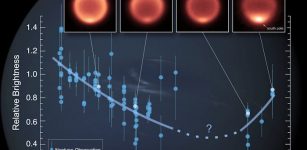 Astronomers Capture Surprising Changes In Neptune’s Temperatures
No Comments | Apr 13, 2022
Astronomers Capture Surprising Changes In Neptune’s Temperatures
No Comments | Apr 13, 2022 -
 Three Comets Orbiting The Nearby Star Beta Pictoris – Found By TESS Mission
No Comments | May 24, 2019
Three Comets Orbiting The Nearby Star Beta Pictoris – Found By TESS Mission
No Comments | May 24, 2019 -
 At Least 300 Million Potentially Habitable Worlds Exist In Milky Way
No Comments | Nov 9, 2020
At Least 300 Million Potentially Habitable Worlds Exist In Milky Way
No Comments | Nov 9, 2020 -
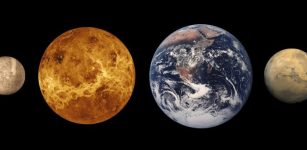 Earth And Mars Were Formed From Inner Solar System Material
No Comments | Dec 26, 2021
Earth And Mars Were Formed From Inner Solar System Material
No Comments | Dec 26, 2021 -
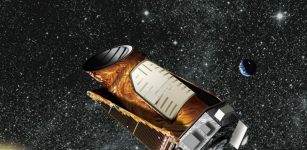 NASA’s Planet-Hunting Kepler Spacecraft Is In Emergency Mode
No Comments | Apr 10, 2016
NASA’s Planet-Hunting Kepler Spacecraft Is In Emergency Mode
No Comments | Apr 10, 2016 -
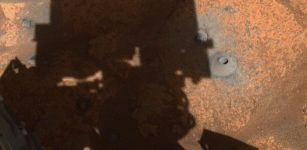 NASA’s Perseverance Rover Begins Collecting Rock In Search Of Alien Life
No Comments | Aug 8, 2021
NASA’s Perseverance Rover Begins Collecting Rock In Search Of Alien Life
No Comments | Aug 8, 2021 -
 Red Giant Betelgeuse Was Yellow Some 2,000 Years Ago
No Comments | Sep 5, 2022
Red Giant Betelgeuse Was Yellow Some 2,000 Years Ago
No Comments | Sep 5, 2022 -
 Dragonfly Mission To Titan: Might Saturn’s Moon Host Some Kind Of Life?
No Comments | Aug 11, 2021
Dragonfly Mission To Titan: Might Saturn’s Moon Host Some Kind Of Life?
No Comments | Aug 11, 2021 -
 Gigantic Oldest And Most Distant Black Hole Ever Observed – How Could It Have Grown So Quickly?
No Comments | Dec 10, 2017
Gigantic Oldest And Most Distant Black Hole Ever Observed – How Could It Have Grown So Quickly?
No Comments | Dec 10, 2017 -
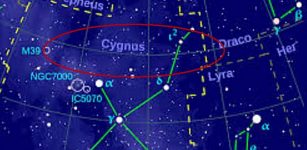 Tremendous Explosion Visible To The Naked Eye Will Change Night Sky – Astronomers Predict
No Comments | Jan 12, 2017
Tremendous Explosion Visible To The Naked Eye Will Change Night Sky – Astronomers Predict
No Comments | Jan 12, 2017
